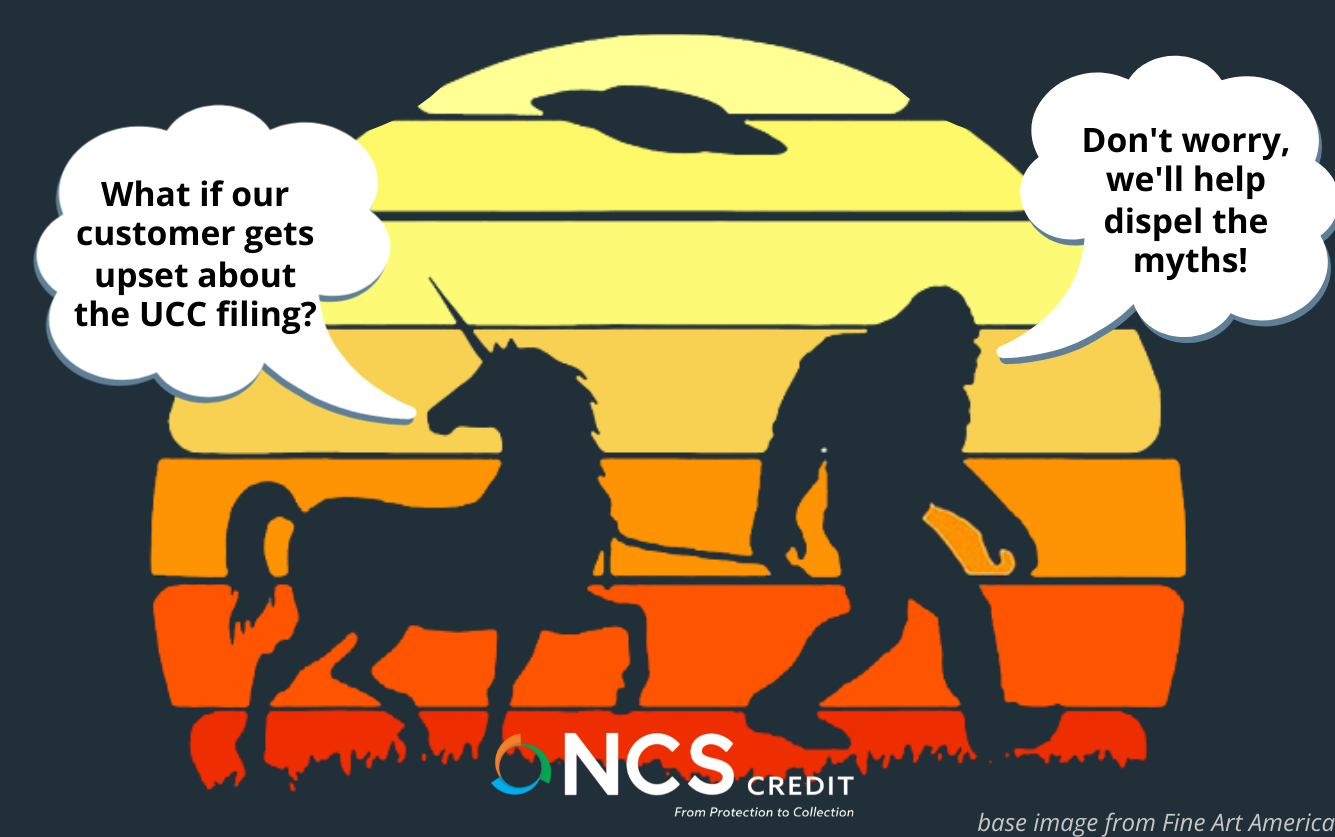The 6 Myths of UCC Filings: Big Foot, a Unicorn, and a UCC Financing Statement
No, wait – not the right joke. Let’s try again. Big Foot, Unicorns & UCC filings all have one thing in common: crazy myths surrounding their existence and, in the case of the UCC filing, crazy myths about their effectiveness.
First, what is a UCC filing? A UCC filing allows a creditor to secure A/R, inventory or equipment by leveraging their customer’s assets as collateral. The UCC filing (aka UCC-1)is a document filed with the Secretary of State. The UCC serves a public notice of your legal claim to certain collateral owned by your customer, protecting you if your customer doesn’t pay.
While we aren’t experts on Big Foot and Unicorns, we are experts on UCC filings and the immense benefit UCC filings bring to your credit process. Let’s dispel some of the age old myths about UCC filings.
UCC Filing Myth 1: “It’ll never work.”
“I’ll always be behind the bank and I’ll never get paid.”
Fact: Banking relationships change (like refinancing). You may need to subordinate to a bank (essentially, the bank will take first spot and you’ll take second), but you will remain ahead of other secured creditors.
UCC Myth 2: “My customer’s bank won’t let them sign the security agreement.”
Fact: Actually, the bank shouldn’t have a problem with your customer signing a security agreement and you being a secured creditor. The only caveat may be the bank wanting to maintain its first position and asking you to subordinate.
UCC Myth 3: “The UCC filing will hurt my customer’s credit rating.”
Fact: UCC filings do not impair your customer’s credit rating. UCC filings will appear on the credit report, but simply to provide confirmation that another creditor has a secured position or pledged collateral for trade credit.
UCC Myth 4: “If I ask for a security agreement, my customer will choose a competitor.”
“If I ask my customer to sign a security agreement, they are going to leave me. Instead, they’ll buy from a competitor that won’t ask them to sign a security agreement.”
Fact: Are you 100% sure your competitors are not filing UCCs or, at the very least, including security language in their agreements?
The truth is, businesses everywhere file UCCs, and it’s a normal aspect of doing business. Reassure your concerned customer that the UCC filing simply allows you (the creditor) to be a secured creditor in the unlikely event they default on payment terms or file for bankruptcy protection.
UCC Myth 5: “Eh, it’s not worth the money or the hassle!”
Fact: Hassles? You don’t need no stinkin’ hassles! This is why you partner with NCS Credit — we handle the hassles for you.
We provide Essential and Premium UCC filing services. Depending on your needs, our UCC experts can
- cultivate your collateral description
- review your agreement to ensure it contains important aspects like the granting clause
- pull the articles to confirm your customer’s name and jurisdiction
- process the UCC filing
- conduct a reflective search to ensure the filing has been indexed correctly
- monitor the filing for expiration
- monitor your customer for changes with the Secretary of State
What may seem like a hassle for you is fun for us! A nominal fee could save you hundreds of thousands of dollars in the event your debtor defaults or files for bankruptcy.
In 2024 Chapter 11 bankruptcies, secured creditors recovered approximately 98% of their claims — that’s 77% more than their unsecured counterparts.
UCC Myth 6: “A UCC filing will make me sprout a horn, grow fur & give me magical powers with glitter!”
Fact: That would be so cool! But, it’s just another UCC filing myth.
The Bottom Line
UCC filings are magical; UCCs grant you a security interest and put you in the best possible position to get paid, in the event your customer defaults.
Take the smart step and become a secured creditor, and don’t believe all the mythical malarkey surrounding their effectiveness.
NCS Credit Is Your UCC Filing Expert
We are UCC experts and we can help you implement a full service UCC Filing Program. Need help with a single filing? We do that too! Contact us today.
Editor’s Note: This content was originally published in May 2014. It has since been updated and revised for 2025.


